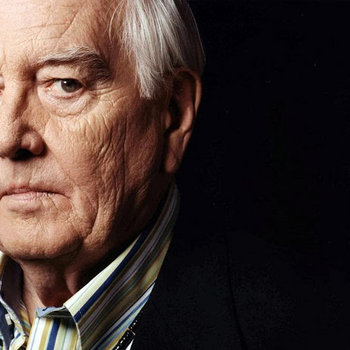
(short pause for thought.)


A few years ago, I began a private personal experiment of freely referring to some of my artistic heroes as my teachers. To my own students, with collaborators in the throes of creative problem solving, and even just among friends, I started saying things like “my teacher had this great way of elucidating this concept” or “my teacher would approach this issue this way.” A select few artists in different media entered this experiment, but Robert Ashley—the American composer of experimental music known especially for his innovative and highly personalized conception of opera—has by far been invoked the most. Call it parasocial, call it wish fulfillment; to me, it’s more like an extension of the moment when the familiar and tender feeling one has toward an artist’s work naturally motivates a need to be less formal when referring to them as people: Martin Scorsese becomes Marty, John Coltrane becomes Trane, Dmitri Shostakovich becomes Shosty. For a while, Robert Ashley became Bob Ashley, but it genuinely feels more accurate to refer to him as my teacher Bob.
(I am completely knowable in every way.)
To be clear, I’ve never met my teacher Bob—in fact, I really only came to his work upon his death in 2014. His three-and-a-half-hour opera for television, Perfect Lives, is often considered his masterwork and has also served as a wellspring for personal and creative inspiration since I first heard it almost ten years ago. As it turns 40 this year, more and more evidence continues to emerge of how deeply it has touched the imaginations of many artists who relate to it more like a cult film or work of spiritual literature than a record or piece of “classical” music. Perfect Lives is as charming as it is unknowable, as disarming as it is opaque. It pulls a bizarre magic trick of being one of the densest pieces of avant-garde music of its era, and it is as infinitely quotable to its acolytes as The Big Lebowski is to so many others. It is perhaps the most “if you know you know” opera that’s ever existed.
(Long live the avant- WHOA! Long live the avant-garde.)
Perfect Lives is, in Bob’s words, a “comic opera about reincarnation,” and ostensibly tells the story of a lounge singer and his best pal (Ashley as the singer, and the luminary Blue “Gene” Tyranny as Buddy, the greatest piano player in the world) rolling into a small Midwestern town, meeting many colorful characters, and getting roped into a bank robbery in which all the money will be returned as a gesture of conceptual art.
I’ve viewed and listened to the entirety of Perfect Lives dozens of times and truly never once have finished its final episode with clarity about this narrative, however. One of my favorite things about Perfect Lives, and in turn one of the great lessons it teaches, is that some works of art are essentially invulnerable to bad faith criticism simply because any possible jabs are objectively true. Is this opera inscrutable and sort of hard to focus on? Absolutely. Do the sounds of the primitive drum machines and early 80’s keyboards border on gauche? For sure. In the libretto, are the rapid oscillations between pure ennui, made-up axioms, and full-on punchlines a little disorienting? Of course. And yet, this is a piece that routinely puts a tear in my eye, gets my heart racing, and enters my daily life through quotation the way that scripture does.
(We don’t serve fine wine in half-pints, buddy.)
Bob’s work has helped me deepen and grow my own inner life more than any other artist. Bob’s own interiority is not only richly developed but so uniquely on display in such a courageous and personal way compared to so many composers associated with “Experimental Music.” Perfect Lives is an incredibly abstract work: it truly is three-and-a-half hours of Bob talking on top of computer-pop electronic tracks and improvised avant-boogie piano. But it’s also a work about living, dying, and the possibility of reincarnation. It’s a piece inextricable from the poetics of the Midwest (I’m a Chicagoan), and it’s a piece about the struggle of making art and finding meaning in your desire to do so.
(remove the, remove that, leave this)
Most practically in my life, Bob has enabled me to call my work “opera” and insist that a seemingly small idea is likely operating on a bigger scale than the surface implies. He’s also enabled me to trust and love my own voice, both literally and figuratively, to trust that I am singing even if it sounds like I’m speaking, to remove more metaphors and leave more truths.
(I know why respects me, I’m the captain of the football team)
An important distinction to make about Bob’s own vocal performance is that his speech is not like singing and his singing is not speech-like: he simply is singing. I adore holding the libretto to Perfect Lives as a book, and I have admired every new staging of the piece from other artists like Matmos, the Varispeed Collective, and Alex Waterman’s Spanish-language version, Vidas Perfectas. However, I don’t think it’s too bold of me to assume that one of the primary magnets that draws anyone into Perfect Lives is Bob’s singing. That beautiful voice, the utter trust in himself to sing so beautifully while reciting a novel’s worth of text. His inimitable collaborators, the gorgeous and instantly recognizable “orchestra” from Peter Gordon, Blue “Gene” Tyranny’s near-comical level of virtuosity, and the only vocal performances on record that split the difference between new wave backup singers and menacing Greek Chorus from David van Tieghem and Jill Kroesen. For me, all of this magic is a lesson from Bob: you are indeed singing, you are a good singer, trust those around you to do their own magic, and the cumulative effect will be beautiful beyond description.
(I want to say something about myself)
When I make music with people I love, I can succumb to self-consciousness like most artists, wondering about the ramifications of the mountains of energy put into something for a small audience, or fearing that the emotional weight of a project is being lost in abstraction. Perfect Lives is certainly a difficult work of art in many ways, but it’s also deepened my relationship with my beloved Midwest, it’s made me pray harder and more purposefully, it’s made me more at peace with the equanimity of passing through this world. This long monologue has sharpened my tools as a teacher, it’s made me sing more and consider more things as “sung.” It’s made most texts into poems and turned the most hilarious quotidian situations into my daily life operas.
(Just one more time, then put in the joke museum)

When reflecting on this experiment of referring to Bob as my teacher, I wondered why it came so naturally and easily with Bob first, and why it took a little more private effort with other artistic heroes. If you’ll permit a little operatic flight of fancy (the self is without coincidence)—my answer feels most clear when thinking of the very beginning of Frank Capra’s beloved and perennial classic It’s a Wonderful Life. The film begins with prayers reaching heaven, and in a moment of strange cosmic opera, angels are represented as a nebula in outer space receiving the prayers.
FRANKLIN: Yes, Clarence. A man down on Earth needs our help.
CLARENCE: Splendid! Is he sick?
FRANKLIN: No, worse. He’s discouraged.
My teacher Bob has really done the single most generous thing a teacher can do: encourage. I’m thankful for the permission Perfect Lives has given me, and the place it’s created to return to again and again. In obligatory Jewish prayer, the question of why we repeat certain blessings day after day is built into the practice itself—perhaps one answer is that we return every time slightly altered, and in need of new encouragement.
(What’s going on? I’m not the same person I used to be)
Ethan T. Parcell is a composer, artist and educator based in Chicago. His work explores ideas of smallness, hospitality, and union, and is realized primarily through composition and drawing. He is the leader of experimental opera ensemble Focus Group LLC/Solutions, the ongoing recording project The World Without Parking Lots, and the Duck Brain Anniversary Band. Online, his work, his music, his Instagram.







